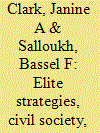|
|
|
Sort Order |
|
|
|
Items / Page
|
|
|
|
|
|
|
| Srl | Item |
| 1 |
ID:
075371


|
|
|
|
|
| Publication |
2006.
|
| Summary/Abstract |
In 1989, Jordan suspended marshal law, lifted media restrictions, expanded freedoms of association, and reintroduced parliamentary elections. Although these steps ushered in a dramatic, albeit limited, political opening, by 1997, many of these measures had been reversed. Indeed, today throughout most of the Middle East, the incipient democratization processes of the 1990s are labeled as "stalled" at best. However, as Jillian Schwedler states, these structural openings and closings do not provide the whole story of these Throughout the region, Islamists, liberals, leftists, and conservatives frequently sit together in opposition blocs and coordinate activities against the state-activities on which they did not cooperate a decade earlier-while remaining bitter rivals in other areas. The Higher Committee for the Coordination of National Opposition Parties (HCCNOP) in Jordan, founded in the mid-1990s in response to normalization efforts by Jordan with Israel, is one such example. A committee of thirteen opposition parties, it includes the Communist and Ba[hamza ]thist parties and the Muslim Brotherhood's Islamic Action Front (IAF). The IAF is very proud of its participation in the HCCNOP and claims that it is a democratic model for the Arab world. It points to the fact that it coordinates deals and "shakes hands" with secularists as evidence of the Party's moderation. The IAF's participation in the HCCNOP raises a variety of questions regarding the relationship between cooperation and democratization. What is the significance of cross-ideological cooperation for political liberalization and democratization? What are the conditions and mechanisms of cooperation? Finally, to what extent do Islamists moderate as a result of cooperation?
|
|
|
|
|
|
|
|
|
|
|
|
|
|
|
|
| 2 |
ID:
124480


|
|
|
|
|
| Publication |
2013.
|
| Summary/Abstract |
This article explains the endurance of sectarian identities and modes of political mobilization in Lebanon after the civil war. This is done by examining three case studies that demonstrate a recursive relation between sectarian elites and civil society actors: on one side of this relation, sectarian elites pursue their political and socioeconomic interests at the expense of civil society organizations (CSOs); on the other side, civil society actors instrumentalize the sectarian political system and its resources to advance their own organizational or personal advantage. These mutually reinforcing dynamics enable sectarian elites to penetrate, besiege, or co-opt CSOs as well as to extend their clientelist networks to CSOs that should otherwise lead the effort to establish cross-sectarian ties and modes of political mobilization or that expressly seek to challenge the sectarian system. The article fills a gap in the literature on sectarianism in postwar Lebanon and helps explain a puzzle identified by Ashutosh Varshney in the theoretical debate on ethnic conflict, namely the reasons behind the "stickiness" of historically constructed ethnic identities
|
|
|
|
|
|
|
|
|
|
|
|
|
|
|
|
|
|
|
|
|